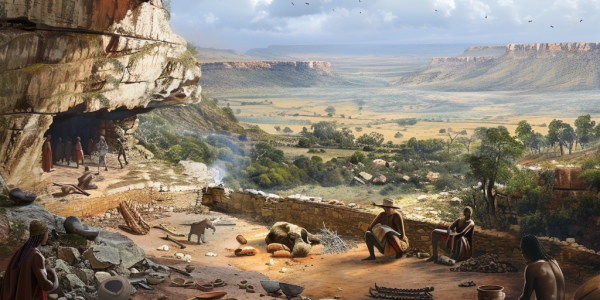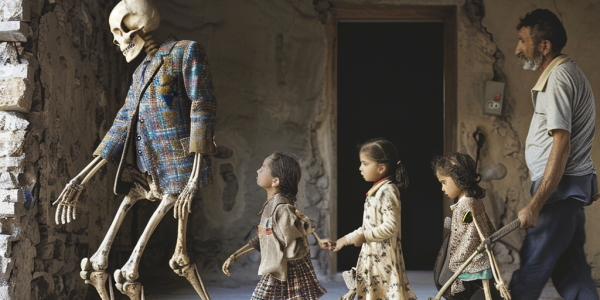Groundbreaking Research Reveals Complex Interactions Between Modern Humans and Neanderthals
Recent genetic research reveals significant intermingling between early humans and Neanderthals, challenging long-held perceptions of these ancient groups. Led by Joshua Akey from Princeton University, the study highlights complex interactions and shared traits, suggesting Neanderthals were not merely primitive but possessed advanced skills and social behaviors. This groundbreaking work redefines our understanding of human evolution, emphasizing the interconnectedness of our ancestry.
Research Reveals Limits of Human Lifespan and Need for Healthspan Focus
Recent research in Nature Aging reveals that while average life expectancy has increased, the maximum lifespan remains stagnant, highlighting a need to shift focus from lifespan extension to improving health span. The study, led by Harvard’s William Mair, emphasizes addressing age-related diseases and investing in innovative research to enhance both longevity and quality of life.
Scientists Reconstruct 10,000-Year-Old Genome, Unveiling Ancient African Cultures
Scientists have reconstructed a 10,000-year-old genome from southern Africa, revealing insights into ancient human cultures and their coexistence with pastoralist societies. This landmark study, published in Nature Ecology & Evolution, emphasizes the importance of genetic research in understanding human evolution and migration patterns, particularly through the analysis of genomes from the Oakhurst rock shelter. The findings illuminate the connections between ancient populations and modern inhabitants, enriching our knowledge of southern Africa’s diverse history.
New Stanford Study Reveals Key Age-Related Health Spikes at 44 and 60
Stanford University’s recent research reveals two significant ageing spikes at ages 44 and 60, challenging the idea of a steady health decline. Led by Professor Michael Snyder, the study emphasizes proactive health management, including diet and strength training, to combat age-related issues like decreased lipid metabolism and muscle loss. Regular health check-ups are crucial for monitoring and addressing these changes, ensuring better long-term well-being as we age.
Scientists Discover Method to Pause Human Development, Transforming IVF Potential
Recent advancements in biological research reveal a groundbreaking method to pause human development, with significant implications for reproductive health and in vitro fertilization (IVF). A study published in Cell explores how manipulating the mTOR signaling pathway allows human stem cells to enter a state similar to diapause, potentially improving embryo implantation timing and success rates in IVF treatments. This innovative discovery opens new avenues for addressing fertility challenges and enhances our understanding of biological adaptability.
The Impact of Online Interactions on Human Morality: A Study on Compassion Fatigue and Virtual Punishment
Learn about the impact of online interactions on human morality and the rise of compassion fatigue due to overwhelming distressing news. Discover how the internet contributes to public shaming, virtue signaling, and distorted moral responses, and explore key findings from a recent study advocating for research on platform design to alleviate negative consequences.
22,000-year-old artifacts challenge human history in North America
Recent discovery of 22,000-year-old tools in Maryland could reshape the timeline of human arrival in North America. Geologist Darrin Lowery’s findings challenge the belief that humans arrived 15,000-20,000 years ago, sparking debates among experts. Despite skepticism, Lowery welcomes further research to validate his hypothesis, shedding light on the mystery of early human migration to the Americas.
23,000-Year-Old Footprints Unearthed in New Mexico
Archaeologists in New Mexico have unearthed 23,000-year-old footprints, reshaping the narrative of human history in America. This groundbreaking discovery challenges previous beliefs and offers valuable insights into the lives of early inhabitants, shedding light on their interactions with the environment and wildlife.
Study Predicts Earth’s Future to be Uninhabitable for Mammals in 250 Million Years
A recent study published in Nature Geoscience predicts the eventual demise of mammalian life on Earth in 250 million years. Earth’s tectonic plates are projected to merge, releasing high levels of CO2 and raising temperatures to 40-50 degrees Celsius, making it impossible for terrestrial life to survive. This underscores the fragility of our planet’s ecosystem and the challenges future generations may face.
The Family That Walks On All Fours: A Unique Medical Mystery
Learn about The Family That Walks On All Fours in Turkey, a unique case that baffled scientists. Despite initial speculation of ‘devolution’, further research revealed a diagnosis of Cerebellar Ataxia, Mental Retardation, and Dysequilibrium Syndrome (CAMRQ). Discover how a physiotherapist and specialized equipment helped the children walk upright, offering hope and a new perspective on this intriguing phenomenon.










